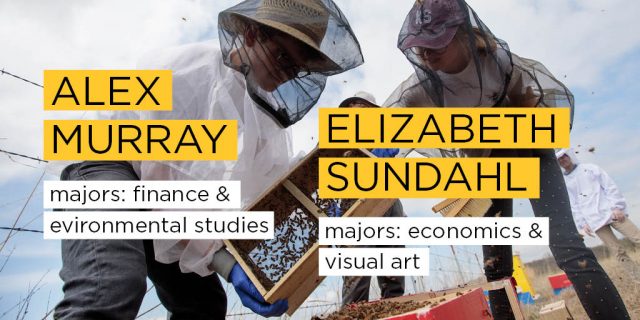
You’ve probably heard about the recent boost in popularity for the KU Beekeeping Club (KUBC), who signed up nearly 300 Jayhawks at this fall’s Hawkfest and Unionfest alone. Not only is the club experiencing rapid growth in membership; they’ve also found success as a small business, making use of their members’ wide-ranging talents to sell everything from honey and lip-balm to stickers and t-shirts.
So what’s driving all the buzz? To find out, we asked KU seniors Alex Murray, co-founder and president, and Elizabeth Sundahl, co-founder and club treasurer. Discover how Alex, a double-major in environmental studies and finance, and Elizabeth, who is double-majoring in economics and visual art, are bringing their creative energy and academic interests to the KUBC to better the environment, connect Jayhawks across disciplines, and build community around beekeeping.
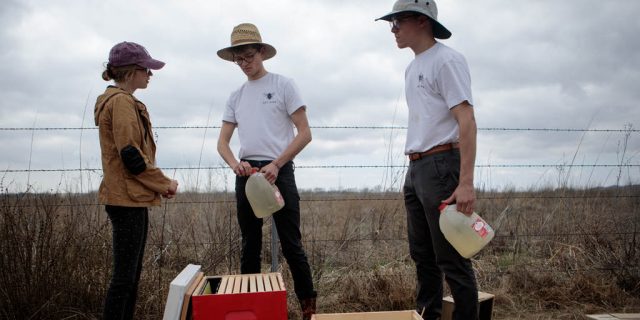
Why did you choose your majors? Was there a moment when you decided this is what you wanted to study?
Alex: I entered into KU knowing that I wanted to ultimately combine my passion for issues I cared about with a background to enable myself to create the kind of change I wanted to see. I began with studying finance to develop a useful skill-set that could be used in a multitude of fields and sectors. At the time, I was pursuing environmental studies as a minor to gain more knowledge about climate change outside of my involvement with numerous other sustainability-focused organizations. After receiving a few additional scholarships, I ultimately decided to pursue environmental studies full-time to fully dive into both worlds. I firmly believe that my experience in a multi-disciplinary undergrad program changed the game for me at KU. I continue to feel far more connected to the entirety of campus and I’ve been able pursue some fascinating experiences I wouldn’t have been able to otherwise, like the KU Beekeeping Club. The ability to listen and learn with a variety of perspectives is, in my opinion, the only way to truly develop your own knowledge and opinion on an issue and I would strongly recommend such a path to anyone.
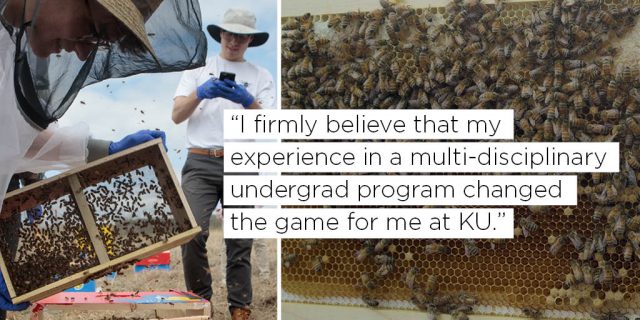
Elizabeth: It took me a while to figure out what exactly I wanted to study at KU. I took a variety of classes my first two years here and then finally declared a major at the end of my Sophomore year. Making art has always been an integral part of my life, and I definitely did not want to halt my art education in college. However, I also wanted to earn a degree in another area of study in case I wanted to apply my art education in a way other than making art my primary profession. An economics class I took my first semester of my freshman year interested me enough to take another economics class, then another, and another. Although the dual major in economics and visual art is an unusual combination, it really works for me as a student. I value the opportunity I have to engage in both analytical and creative problem-solving every day thanks to my unique double major.
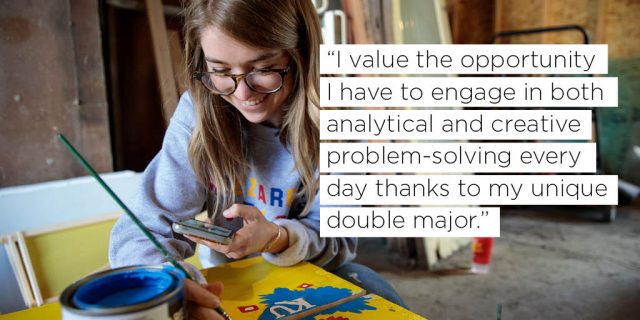
What’s your role in the KU Beekeeping Club, and how did you get involved? What sparked your interest in beekeeping?
Alex: I helped found the KU Beekeeping Club and currently serve as president. I began beekeeping after returning home to my family’s new home in Lawrence, Kansas, after I spent a few months in New York City and Hong Kong. Upon introducing myself to some of our new neighbors, I learned that they kept bees and I asked if I could join them sometime with Elizabeth and Joe (our other co-founder). Soon enough, almost all of us became hooked. They became incredibly gracious and wonderful mentors to Elizabeth, Joe, and me and allowed us to gain experiential knowledge before tackling our own hives, which isn’t something most people get to do. As we progressed in learning how to become real beekeepers, tons of our friends reached out to us and asked to accompany us to our hives. We realized that we had enough organic interest to start the KUBC and the rest is history. At this point, we have over three hundred and ninety-three people involved with us in some shape or form and continue to grow without any significant formal recruiting or advertising. I’m continually blown away by the support we receive from our fellow Jayhawks.
Elizabeth: Bees have been an interest of mine since high school, and they have always been the subject of a lot of my artwork. There was a UDK article written about my bee and nature inspired artwork last year, and Alex saw the article before we met. When he got involved with his neighbor’s hives, he took me with him for a hive inspection. I was hooked during that hive inspection, and since getting to see that hive, bees have been a more important part of my life than I could have ever expected. As a result of the passion sparked during that hive inspection, I helped Alex and Joe found the KU Beekeeping Club and established myself as the treasurer, I have assisted Alex with educational presentations about bees and their impact on our environment, and I have been making even more bee inspired art.
How do you apply lessons or skills you’ve gained in your majors to your work in the KU Beekeeping Club?
Alex: This summer we saw an explosion of activity within our hives and from our support. We’ve been incredibly fortunate to have been able to harvest an amazing amount of honey within our first year and pretty quickly we began processing and selling it as a fundraiser. Soon we added lip balm, stickers, t-shirts, and more. I think we sold through mostly everything within a few days of posting about it through word of mouth alone. Tracking and completing all of these orders became a small business for all of us, and the accounting, finance, and economics majors we have across our founders became highly useful in making our club run smoothly.
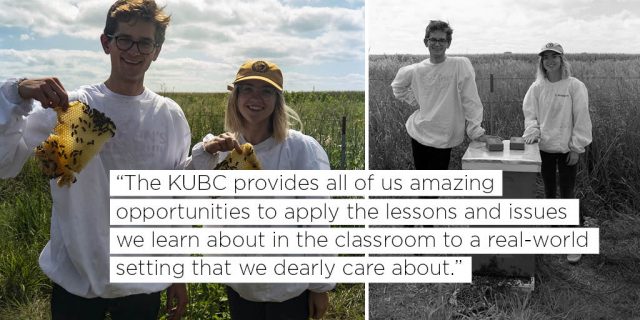
Of course, the entire other side of our majors took the KUBC to the next level. My connections and insights from the environmental studies department helped us land a faculty sponsor, the location of our hives, and vastly grow our membership. Maybe more importantly, I think the KUBC provides all of us amazing opportunities to apply the lessons and issues we learn about in the classroom to a real-world setting that we dearly care about. Like I said earlier, there would be no way I could’ve done something like this without both majors working in sync.
Elizabeth: One of my favorite applications of my visual arts major in the context of the beekeeping club was when we painted our hives. We painted three different Jayhawks on the red, yellow, and blue hives and I think they really stand out in pictures that we use to promote the club. It is nice to know that the knowledge and skills I gained in my art classes can draw attention to the club, benefit the bees, and as a result, better my community. My economics background has helped with the business side of our club. I have been able to use my training in economics to market and sell honey, lip balm, and other club merchandise.
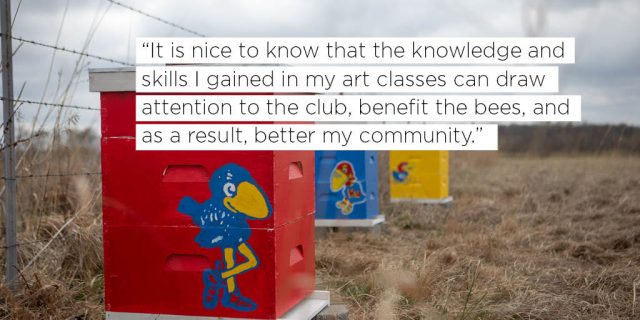
Give a shout-out to a professor, mentor, advisor, or someone at KU who has helped you?
Alex: Oh man – there are plenty. Jennifer Moody, Kelly Kindscher, Jim Guthrie, Deb Smith, and many more have helped lift our club off the ground and help promote our cause. Meg Kumin also produced some fabulous shots of us at launch and helped document our beginning. We genuinely could not have done this without their help. I should also mention John Hedeman, Jennifer Harrison, Anne Wallen, and Uma Outka as a few of many amazing mentors who have been enormously instrumental in helping me realize my potential at KU.
Elizabeth: There have been so many people at KU who have helped us get to where we are as a club. I really appreciate Michael McCaffrey, Norman Akers, and David Slusky because they helped me build my confidence and begin to appreciate my own interests.
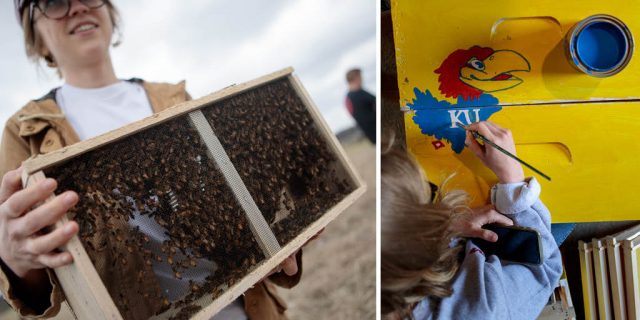
Have you done any internships, study abroad programs, or any service learning experiences you’d like to share?
Alex: I’ve done all of the above which makes this an impossible choice! I’ve held numerous internships from the non-profit, financial, and political sides of the world and made some amazing friends and connections throughout them all. I think internships are super important to answer the question of “what if?” in your life and determining if a prospective career path is the right fit for you. My favorite was probably the chance to intern for a non-profit in New York City. As far as studying abroad goes, I strongly recommend studying somewhere completely new to you both from a geographic and cultural standpoint. I ended up in Hong Kong and fell deeply in love with Southeast Asia. The chance to study at a world-class university like Hong Kong University was something that I never imagined as a freshman, and as intimidating as it seemed, I wouldn’t be the person I am today without that experience.
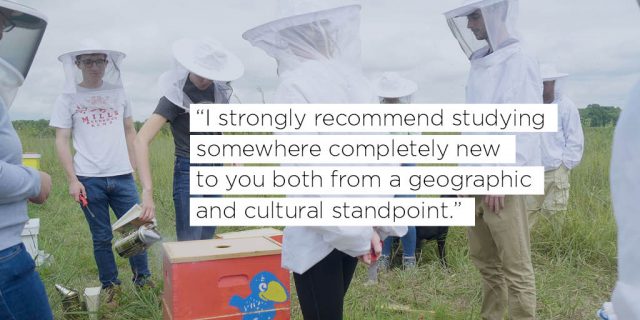
Lastly, I would be remiss to not give a HUGE shout out to Alternative Breaks KU. The service-learning opportunities they provide gave me some of my best friends and memories at this school and allowed me to see parts of the United States and do things I never would’ve otherwise – including accidentally Frenching a wild wolf. I’ve completed three trips during my undergrad and worked at a wolf conservation in Colorado, an LGBTQIA+ youth center in Wisconsin and an urban farm in New Orleans. There’s no way I could recommend these programs enough.
What would you tell your freshman self?
Alex: Buckle up! I had no dream of being as involved as I got at KU, and I feel like I’ve grown immeasurably as a person because of it. I’m really glad that I rarely turned anything down, although sometimes I wonder what life would be like with a little less on my plate. I’m mostly kidding.
Elizabeth: Branch out! I wish I had done a lot more at the beginning of my time in college. I was kind of intimidated by how much there was to get involved with and do on campus. The clubs and activities I’m involved with are what I have loved most about my college experience. Obviously, the beekeeping club was not around when I was a freshman, but I could’ve started making more connections to where I am now if I had branched out more.
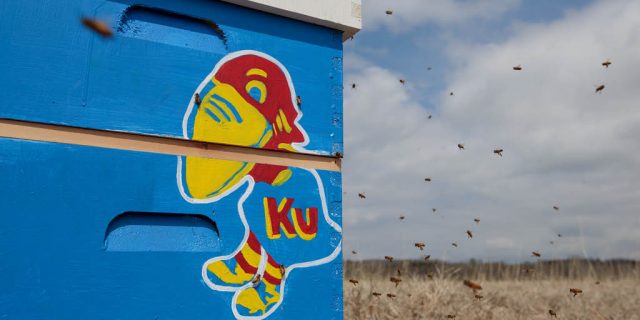
What do you want to do when you graduate?
Alex: Currently I’m pursuing a few nominations by KU to apply for the Rhodes, Marshall, and Mitchell scholarships. Pending those applications, I would either transition to graduate school in Europe or begin working full-time, preferably in the renewable energy sector. Immediately after graduating, however, I’d really like to hike through the Pacific Crest Trail.
Elizabeth: Immediately after graduating I am planning to hike the Pacific Crest Trail for a few months. After that, I am still unsure if I want to start working or attend grad school.
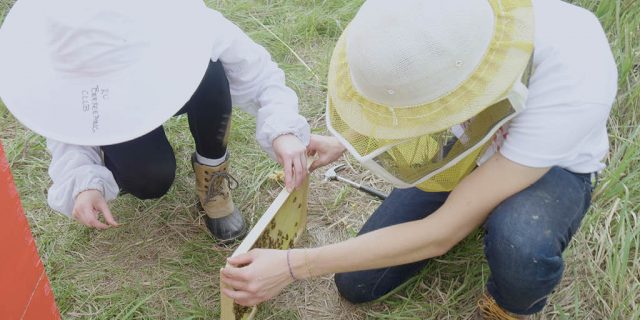
What motivates you?
Alex: Trying anything new and feeling as uncomfortable as I can as often as possible. I think there are so many opportunities people rule out for themselves simply because it’s something foreign to them; in the end, the things I trusted myself the least in doing became some of the best experiences of my life. I hope to help make those possibilities more accessible to anyone at KU, in my community, and hopefully wherever I go. I’m also motivated by making people understand how insanely cool bees are.
Elizabeth: The people in my life are my biggest motivators. My family has always gone out of their way to support me in my endeavors. Whether it’s sharing my art on their social media or buying tons of the KU Beekeeping honey and merchandise, they are always cheering me on. Alex is also a huge motivator and has helped me become the beekeeper I am today. Without him, I would not have had the opportunity to gain knowledge of and experience with bees. My involvement with the KU Beekeeping Club is what I am most proud of in my time in college, and I am thankful to Alex, my family, and the beekeeping community in Lawrence for their support.
Be like Alex and Elizabeth. Branch out and pursue your passions at KU. For more information, explore the KU Beekeeping Club, the Environmental Studies Program, the School of Business, the Department of Visual Art, and the Department of Economics at the University of Kansas.